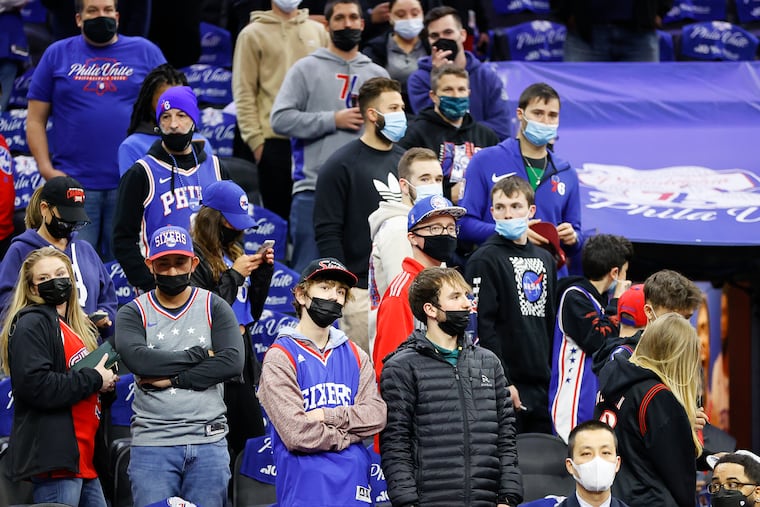Philly requires masking inside again as COVID-19 hospitalizations rise
Hospitalizations of people with COVID-19 have nearly doubled in the past week, spurring concerns over a case increase some hoped might not lead to a surge in hospitalized people too.

Philadelphia reported on Monday that COVID-19 hospitalizations had doubled over the last week, a signal of a rising coronavirus threat even as the city returned to requiring masks indoors.
For the first time in more than six weeks, Philadelphians again had to mask up to shop in businesses, watch the Sixers, go to offices, or work out in gyms, with an exception for places requiring proof of vaccination.
The return of indoor masking is just the first tier of safety protections the city could reintroduce if the pandemic worsens again, and on Monday the trends were pointing in the wrong direction. Just a week after the city announced the return of indoor masking, case counts, hospitalizations, and transmission trends all were in sight of numbers that could trigger the return of vaccine requirements for indoor dining.
“This is a worrisome sign that this wave could be more dangerous than we had hoped,” the Philadelphia Department of Public Health said in a news release.
The city reported there were 82 people with the virus in city hospitals, up from 46 people hospitalized with COVID on April 11, when city Health Commissioner Cheryl Bettigole made Philadelphia the first big American city to resume a masking requirement amid increasing cases.
The city also was averaging 224 new cases a day Monday, compared with 144 a week ago.
A group of businesses and residents are challenging the city’s entire tiered safety system in Commonwealth Court, and the attorney in the case, Thomas King III, said Monday he planned to file an injunction to end the city’s mask mandate.
“We simply say the entire scheme is not legally correct,” King said.
In February, the city introduced a system of benchmarks that used case counts, hospitalizations, and the percent increase in cases to trigger a tiered system of safety interventions. If certain thresholds for two of those three metrics are met, the city has said it would bring back restrictions including a vaccine mandate for indoor dining.
» READ MORE: Why is Philly requiring masks again today when other cities aren’t? We asked the experts.
Last week, the case count and the percent increase in cases met the first threshold, prompting the revived indoor mask mandate.
Monday, the average daily case count was just one case shy of the case threshold to require proof of vaccination. If that number keeps rising — and hospitalizations reach at least 100, or case counts are increasing by 50% or more over the prior 10 days — the city could reintroduce a mandate that requires people to either show proof of vaccination or a negative COVID test to get into restaurants.
On Monday, the city reported numbers showing cases had increased more than 50% over the last 10 days.
City officials did not return calls for comment on whether they were contemplating resuming a vaccine restriction. The city has said it will typically announce changes in safety protocols on Mondays, and there’s no guarantee the numbers this week will reflect next week’s information.
Businesses have repeatedly argued Philadelphia’s safety precautions, which aren’t mirrored in the city’s surrounding counties, put them at a competitive disadvantage.
“Anything that would give guests pause before coming back into the city would be a terrible thing right now,” said Ben Fileccia, director of operations & strategy for the Philadelphia Restaurant and Lodging Association.
Philadelphia’s safety protocols differ from recommendations from the Centers for Disease Control and Prevention, which focus on hospitalizations as the key determinant of risk. According to the CDC, Philadelphia’s risk is still low, which opponents of the city’s system highlight.
“We just really wish they would follow the CDC guidance right now,” Fileccia said.
City officials have said mandates designed to reduce the spread of COVID have repeatedly been upheld in court.
Health experts have mixed views of how well the city’s interventions will work. Several have said that vaccinations are the best weapon against COVID’s spread and that encouraging people to get the doses is worthwhile. The city has walked a tightrope between encouraging caution and tamping down panic, saying the idea is to introduce safety precautions to protect vulnerable people and keep hospitals from being overwhelmed.
» READ MORE: The clues are in the poop: COVID-19 sewage testing is coming to Philly
Hospital staff have said they are monitoring pandemic trends but are optimistic that the recent increases in hospitalizations won’t portend a massive increase in very sick people.
The BA.2 subvariant now dominating COVID transmission in the Philadelphia region and nationally is more transmissible than the omicron variant but apparently no more likely to cause serious illness. Some health officials had anticipated that the city’s high vaccination rates, along with a significant number of people with natural immunity from recent COVID infections, might keep hospitalizations from spiking.